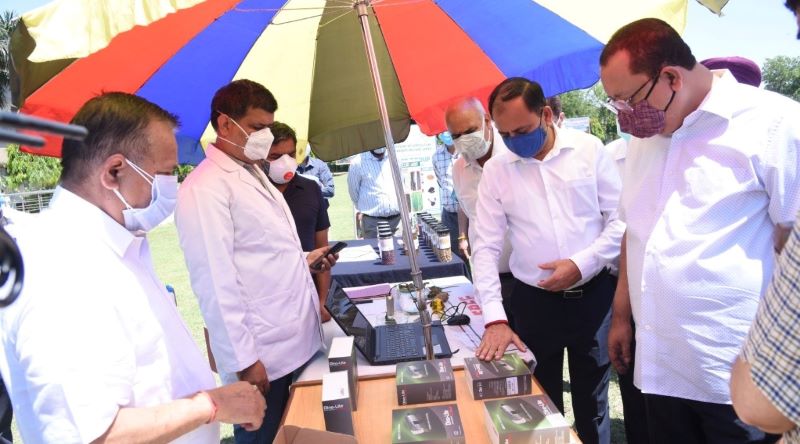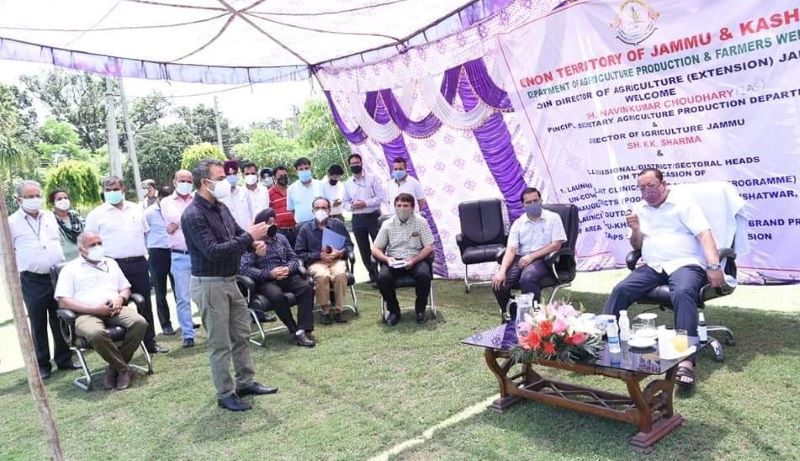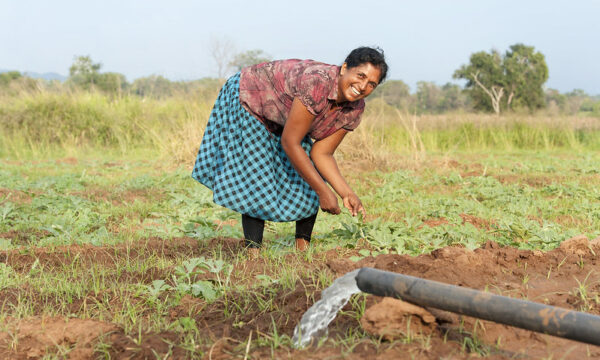Plantwise ePlant clinics have opened in a further five districts of Jammu province in the Union Territory of Jammu and Kashmir. With its mountainous landscape, these districts are often inaccessible to public service providers. To make information available to farmers, the Department of Agriculture, Jammu (DAJ) in collaboration with CABI, has established a network of ePlant clinics.

These will provide farmers with plant health and pest management advice, helping farmers to lose less of their yields. DAJ and CABI piloted the Plantwise programme in 2016. 15 clinics were set up in Jammu, Kathua and Samba districts. These clinics provide farmers with practical advice on pest management and plant health. Thanks to the pilot’s success, DAJ opened Plantwise ePlants clinics in two further districts (Udhampur and Rajouri).
Covid-19 fuelling need for clinics
With the Covid-19 pandemic, ePlant clinics have proved more relevant than ever. As a result, DAJ has decided to ensure the Plantwise programme covers all ten districts. Extension workers are now ready to help farmers throughout the region, having been trained on Plantwise modules, including disease diagnosis and recommendations.
Principal Secretary, Agriculture Production and Farmers Welfare Department, Sh. Navin Kumar Choudhary, formally launched the ePlant clinics for the districts of Ramban, Doda, Kishtwar, Reasi and Poonch. He highlighted that this step will help combat insect pests, disease and plant health problems for various agricultural crops. It is also hoped data collected from these new clinics will help prepare the department for future pest outbreaks before they happen.
Plant clinics total 40
Director of Agriculture Jammu, Sh. K. K. Sharma, stated that the department will now be operating 40 ePlant clinics in ten districts of Jammu division. This is in coordination with the main Plant Health Clinic, Directorate of Agriculture Jammu, which provides technical backup. He stressed the importance of educating farmers on not only plant health matters but also the adverse effects of improper use of pesticides and their enduring negative impacts.
Joint Director Sh. Shahid Iqbal, who is also monitoring Plantwise programme, stated that programmes like Plantwise are urgently needed. He said that DAJ will make every effort to expand the programme. The aim is to increase the number of extension officials at both province and district levels and to establish even more ePlant clinics. By doing so they hope to provide even the most remote farmers with information on plant health and pest management.

Plant clinics launch event
Chiefs from all five districts attended the launch event. They were provided with USB microscopes for pest diagnosis and a fall armyworm booklet developed by CABI. The booklet contains high-quality images of fall armyworm, as well as further information on identifying and dealing with the highly invasive pest.
Attendees and stakeholders were provided with a range of information on not only fall armyworm, but also other major crop pests, all of which were gratefully received. It is hoped that a fall armyworm webinar can be take place. This would provide extension officials with information on the diagnosis and management of this invasive pest, which they can then pass on to farmers throughout the Union Territory.
About Plantwise
Since its launch in 2011, CABI’s Plantwise programme has been introduced to 34 countries in Africa, Asia and the Americas. The aim was to increase food security and improve rural livelihoods by reducing crop losses. This was achieved by establishing sustainable networks of local plant clinics, run by trained plant doctors, where farmers receive practical plant health advice. Working in close partnership with over 170 in-country partners, Plantwise strengthened national plant health systems from within, enabling countries to provide farmers with the knowledge they need to lose less of what they grow.
eClinics rolled out in Jammu, India
Find out more
Lockdown unlocking technology for India’s farmers
Find out more
Working together online to support farmers during lockdown in India
Find out more
Acknowledgement
CABI gratefully acknowledges the financial support of the Foreign, Commonwealth & Development Office (FCDO), United Kingdom; the Directorate- General for International Cooperation (DGIS), Netherlands; the Swiss Agency for Development and Cooperation (SDC); the European Commission (DG DEVCO); the Australian Centre for International Agricultural Research (ACIAR); the Ministry of Agriculture of the People’s Republic of China; Irish Aid; and the International Fund for Agricultural Development (IFAD).
1 Comment
Leave a Reply
Related News & Blogs
How plant clinics are strengthening crop health services in Bangladesh
When the first-ever plant clinic in Bangladesh opened in Dhaka in 2013, it initially faced a lack of interest due to its novelty and limited awareness among farmers. However, it went on to expand, providing advice to over 17,000 farmers and led to the…
2 July 2025





Very good initiative.